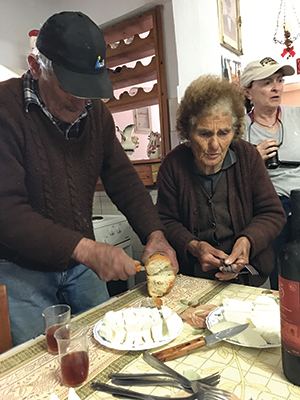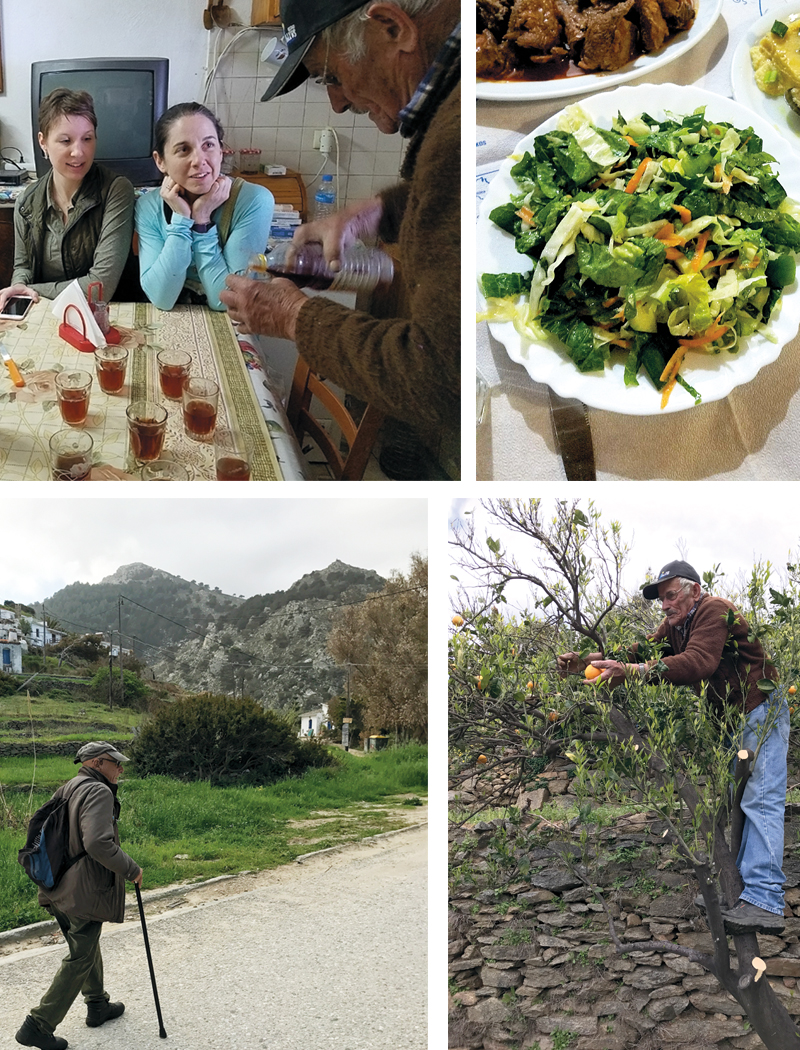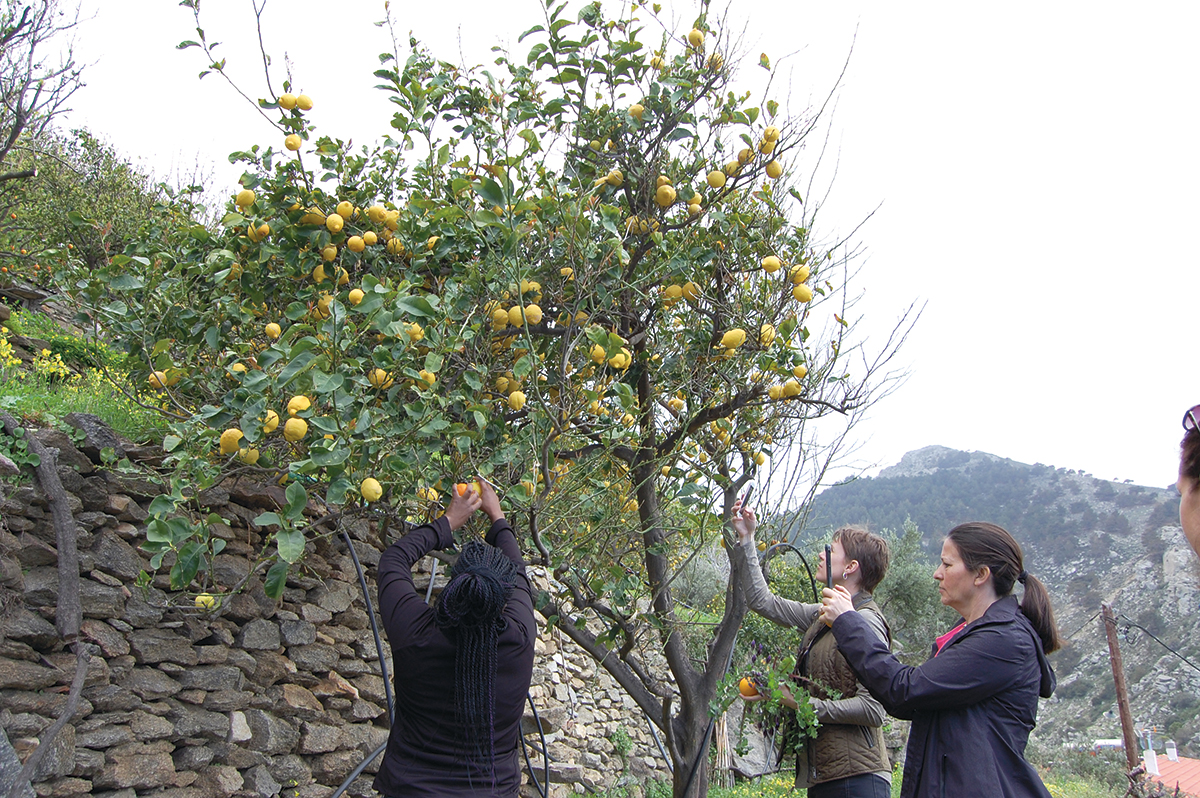Lessons From Those Who Live the Longest
Story by Stephanie Woodcox and Christina Bautista Swathwood, Contributing writer: Stephanie Mouw, photo courtesy of Stephanie Woodcox and Christina Bautista Swathwood
Hear the term “island life” and soon you’ll conjure up images of sandy beaches, clear water and beautiful sunsets. What if you could have all of this plus a promise of longevity? It certainly sounds too good to be true! But a small Greek island in the Aegean Sea is said to deliver on it all. We wanted to see for ourselves.
Land of the Living
Purdue University Extension Health and Human Sciences (HHS Extension) sought to gain a better understanding of what it means to age successfully, hoping to learn from other cultures.
To do so, HHS Extension read Dan Buettner’s book The Blue Zones, which describes five geographic regions in the world with the greatest longevity. The Greek island of Ikaria was one such place, with nearly one out of three people living to age 90.
“Reading this book sparked interest in visiting a ‘blue zone’ to bring back lessons to share with communities statewide,” says Stephanie Woodcox, HHS Extension health and wellness specialist.
Drawing upon Extension’s partnership with the School of Nursing, Woodcox asked Nancy Edwards, associate professor of nursing and gerontology expert, and some nursing students to accompany a team of Extension educators to Ikaria.
“Blue zones have such success in healthy aging that it seemed like an amazing opportunity to experience how these individuals live and if their lifestyle could be translated to the U.S.,” Edwards says.
Nursing student Brandi Foree felt fortunate to study an aging population in another part of the world.
“It’s an often-forgotten group of people,” she says. “I think many simply look at older adults and think ‘They’ve lived their life.’ But there is so much more they can teach us.”

Island Lessons
It did not take long to identify themes of Ikarian life that contributed to their health and longevity: socialization, fresh and natural foods, and a sense of purpose.
Socializing often disappears once American adults enter assisted living centers. In Ikaria, not only are there no senior centers, but socialization is at the center of their daily lives.
“While hiking the mountain, we met an 85-year-old who invited all 15 of us into his house. He brought out jugs of homemade wine while his wife served homemade cheese, goat meat and bread,” Edwards says. “These are people who can least afford it, but were the most welcoming.”
Being with and helping others is second nature to Ikarians. It was not uncommon to see men take a break from their labors to gather for a coffee or glass of wine with neighbors. Women would do the same, but often stayed longer to help with chores or meal preparation. Working and relaxing together is embedded in their culture. They rely on being physically present to stay connected in their relationships instead of depending upon telephones, cell phones or the internet — all of which were scarce on the island.
Local. Fresh. Homemade. Nearly all of the foods available and consumed by Ikarians can be described this way. “Every house had a garden with rows of vegetables and fruits planted,” Woodcox says. “Families purchased fresh fish or bread delivered daily by truck from nearby villages.”
Breakfast included bread topped with fruit preserves, yogurt with honey, tea, and, occasionally, eggs. Lunch often consisted of heaps of greens and vegetables. Dinners were heartier, served with some fish or meat (usually goat), along with more vegetable dishes (cooked in olive oil), bread and wine.
Ikarians depend on the land to provide them what they need. When picking greens from the mountain that would soon become our lunch, an 85-year-old man noticed and quickly motioned us over to his lemon and orange trees. To our surprise, he climbed the trees and tossed down sweet-smelling fruits for us to enjoy.

Contrary to American culture, Ikaria has no fast-food restaurants, and grocery stores provide very few processed food options for purchase. With such fresh and healthy food choices in their diet, it is not surprising that Ikarians do not suffer from many chronic diseases that plague Americans, such as heart disease, diabetes, obesity and cancer.
We often think one’s purpose in life needs to be revolutionary to ensure our legacy. Yet, Ikarians proved that simple living is enough to lead a happy, fulfilling life.
One morning, the group watched as a 90-year-old shepherd hiked down the steep mountain to tend his animals. As he took a rest alongside the dirt road, he shared that caring for his wife and his flock is what gives him purpose each day. He attributes his longevity to these daily tasks and said bluntly, that without them, he would be dead. Another older woman we met shared that the reason she gets up each morning is to make breakfast for her family and care for her grandchildren after school.
Often, we try to protect our parents and elderly family members by taking away their daily chores to make life easier for them. The Ikarians taught us that it is often these tasks that give them reason — their purpose — to rise each day and remain active.

Lifelong Impact
When asked what it takes to live a long life, a doctor (one of only eight on the island) smirked and said, “Laugh a lot; dance a lot; fall in love; work a lot, but not too much; not to have stress; and not to eat too much.”
Returning home, HHS Extension plans to incorporate what was learned into their educational programs (focused on food, family, money and health), which serves nearly 1 million individuals and families each year.
From a health care perspective, “Ikaria helped us learn not only how people live differently but how to listen better too,” Edwards says, glad her students could share in this lesson. “Providing proper care requires that we listen to what the patient says and try to experience it from their point of view.”
Despite the short time on the island, the impact of these experiences and relationships will be long-lived, in true Ikarian fashion.
This trip was made possible through generous support from the Monhaut Zmola Fellowship. To read more about the team’s experiences in Ikaria, visit https://www.purdue.edu/hhs/extension/culturalimmersion/ikaria2017.
More Life 360 Stories
Alumni
- Outdoor Learning Space
- A Fond Farewell
- Lessons From Those Who Live the Longest
- HTM Professor Leads Global Trend in Advancing Sustainable Tourism
- Convenience, Health Fuel Growth in Boxed-Food Delivery Industry
- Defining the Field for 80 Years
- Compassion Comes Full Circle
- Purdue Memorial Union Inspired Houston-Based Restaurateur
- Where are they now?
Faculty
- Outdoor Learning Space
- A Fond Farewell
- Tips for Aging Well
- Developing a Child Care Curriculum for the Department of Defense
- Not to be Forgotten
- HTM Professor Leads Global Trend in Advancing Sustainable Tourism
- Convenience, Health Fuel Growth in Boxed-Food Delivery Industry
- Better Beginnings
- Defining the Field for 80 Years
- MRI Facility Opening New Avenues of Research

